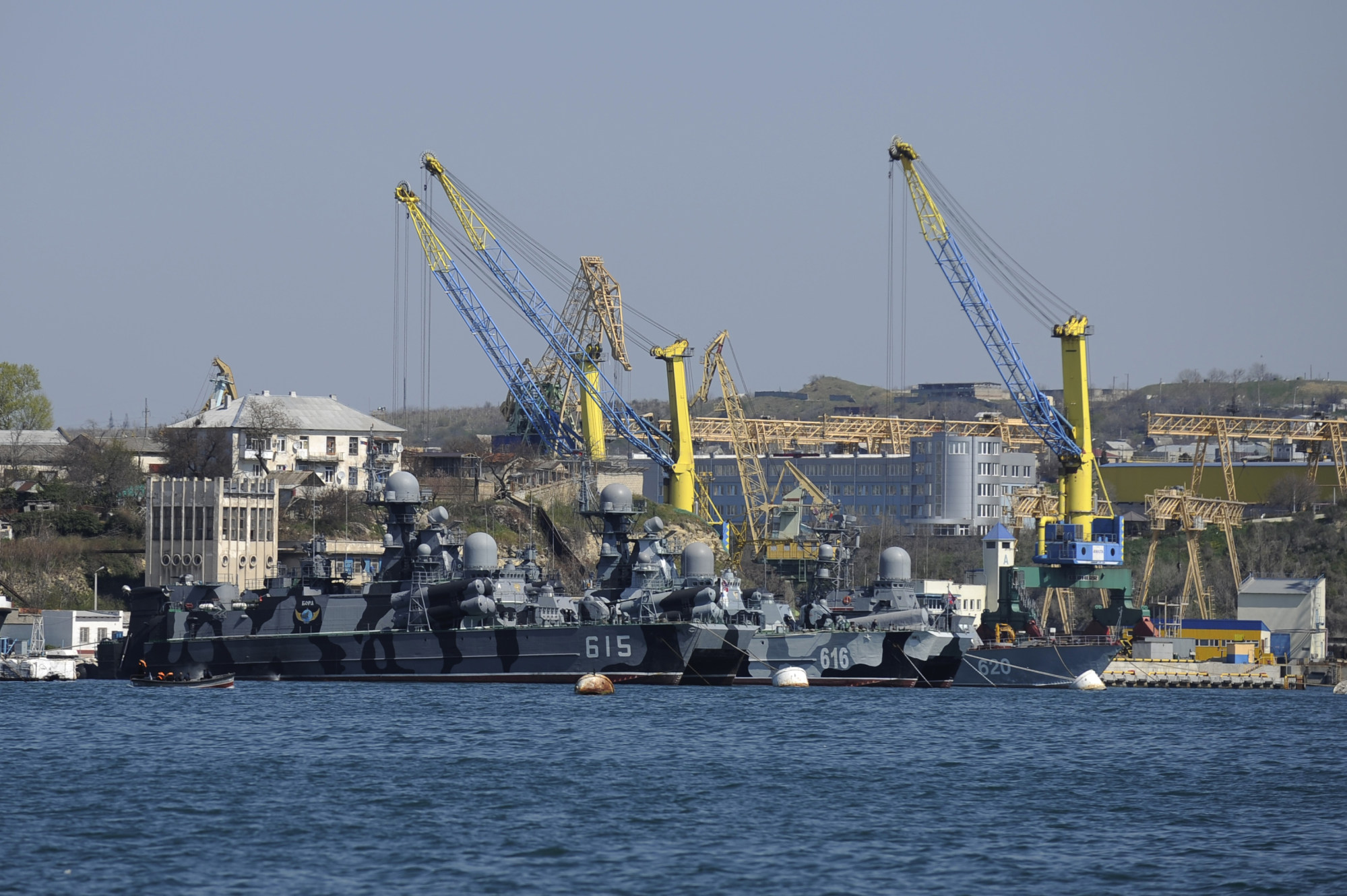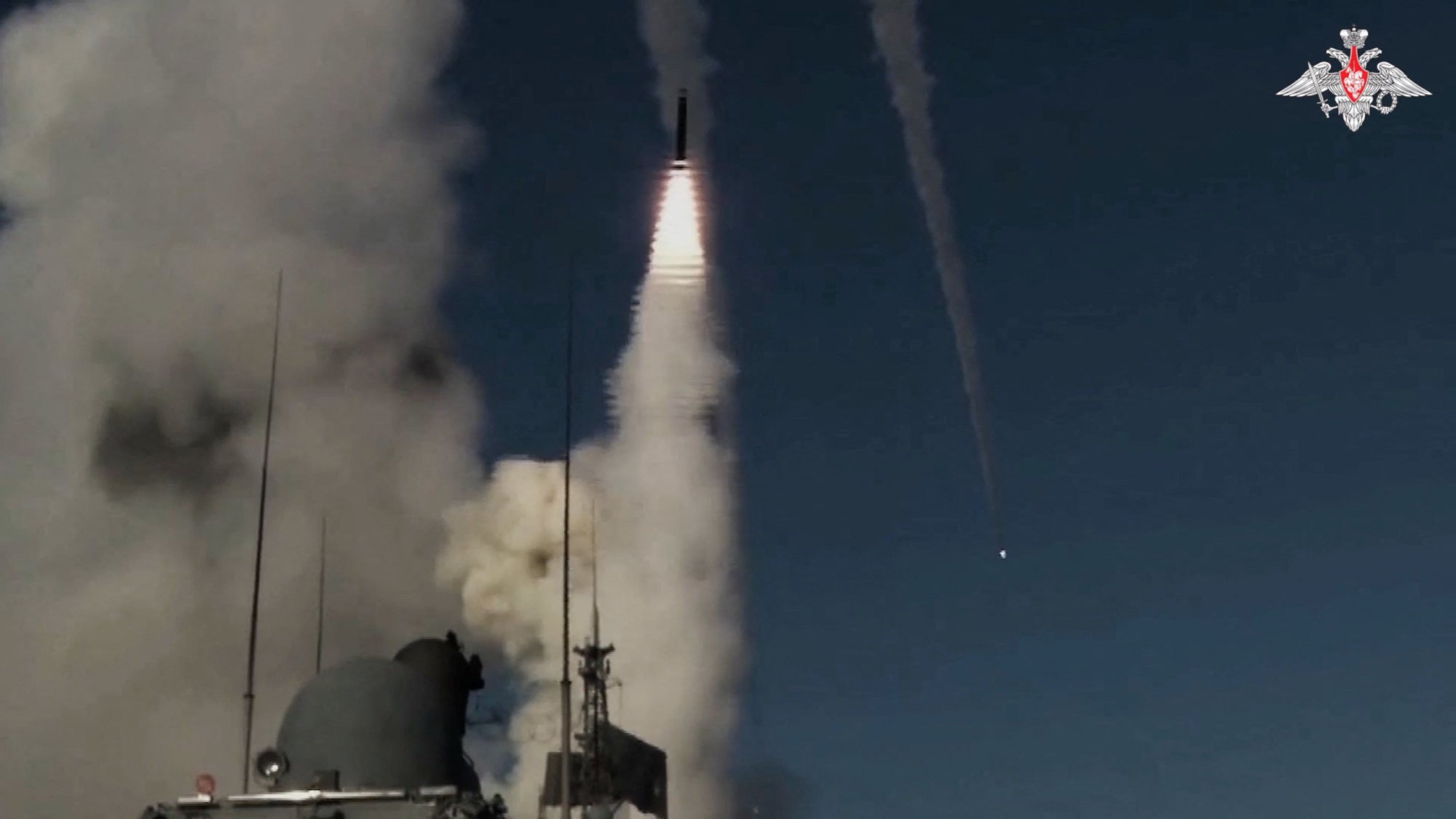
Russia’s Putin forced to relocate ships in Crimea after Ukraine strikes
- Drone and missile attacks are enabling Ukraine to overcome Russian naval dominance in the Black Sea
- Russia has lost at least 20 vessels including warships since the start of the Ukraine war in February 2022
Russia has based its Black Sea fleet in Crimea for 240 years. Now President Vladimir Putin is at risk of losing the flagship naval hub as Ukraine steps up attacks in the occupied peninsula.
The assaults have forced Russia to move its ships further from harm’s way, almost a decade after Putin annexed Crimea with the goal of preserving the fleet’s presence there as Kyiv drew closer to the US and Europe.
“No Crimean port is safe any more for Russian warships,” said Ruslan Pukhov, director of the Centre for Analysis of Strategies and Technologies in Moscow. Ukraine has “basically ejected the fleet from Crimea”.
Its latest attack by a cruise missile claimed a large Russian landing ship at the eastern Crimean port of Feodosia on Tuesday.

In all, Russia has lost at least 20 vessels including warships, a submarine and landing craft since Putin ordered the full-scale invasion of Ukraine in February 2022, according to the Ukrainian Armed Forces and independent assessments by the open-source intelligence outlet Oryx.
The breakthrough in Crimea provides Ukraine with some good news after its much-anticipated counteroffensive on land failed to oust Russian forces from occupied territory in the country’s east and south.
Russia plans naval base on Black Sea coast of breakaway Georgia region
Political disputes in the US and the European Union are holding up more than US$110 billion of financial and military aid to Ukraine, casting doubt on allied support to Kyiv as the war approaches two years with no end in sight.
To be sure, while the attacks have increased pressure on Russian defences in the peninsula as well as on supply lines to its troops in occupied southern Ukraine, they’re likely to have limited impact on battlefield developments with the fighting on land largely at a stalemate.
Yet Ukraine’s success at sea is all the more notable because it lacks its own warships. Instead, it’s challenging Russia’s naval supremacy using missiles and unmanned maritime drones.
The Ukrainian attacks forced Russia to adopt “a more permanent basing pattern along the eastern Black Sea coast as it transfers assets away from Crimea,” the Washington-based Institute for the Study of War said in a report.
Supplies of British Storm Shadow and French Scalp cruise missiles have helped Ukraine tip the balance in its favour, enabling it to evade air defences to conduct accurate strikes on Russian targets.
The raids have proved so effective that they’ve helped Ukraine to break the Kremlin’s efforts to block its grain exports through the Black Sea after Moscow in July abandoned a deal brokered by the United Nations and Turkey that had ensured safe passage for ships.

Ukraine shipped 10 million tons of commodities, mostly grains, through the passage since August.
Russia’s fleet “is no longer able to operate in the western part of the Black Sea,” Ukrainian President Volodymyr Zelensky said October 24, calling it a “historic achievement” for his country.
While Ukrainian forces haven’t yet established full fire control over Crimea and its waters, “we will. It’s just a matter of time,” he said.
Russian admiral shown on video call after Ukraine said it killed him
Ukraine’s navy reported Thursday that six Russian military ships were operating in the Black Sea, though it also accused Moscow of switching off vessels’ location transponders.
The sinking of Russia’s flagship Moskva missile cruiser in April last year was the most high-profile loss.
Ukraine said its Neptune missiles attacked the ship, which sank after a fire broke out. Russia claimed at the time that the ship sunk in a storm, though video on social media contradicted this explanation.
The Kerch Strait bridge linking Russia to Crimea and used to resupply Moscow’s forces has been attacked twice, in October last year and in July. In September, Ukraine hit another shipyard on Crimea’s western coast, affecting two navy vessels.
It fired cruise missiles into Russia’s Black Sea fleet headquarters in Crimea’s Sevastopol in September, causing extensive damage and prompting Russia to relocate vessels to other ports including Feodosia and Nororossiysk.
Russia hasn’t commented on the location of its Black Sea fleet, though satellite images indicated vessels likely moved from Sevastopol following the strike on the headquarters.
Ukraine claims to recapture Black Sea oil platforms from Russia
After this week’s attack in Feodosia, Russia’s fleet is now essentially reliant on Novorossiysk. Still, Ukrainian naval drones succeeded in destroying a large landing ship there in August, too.
Russian plans to build a naval base further south along the Black Sea coast in Georgia’s Kremlin-backed separatist region of Abkhazia are expected to take several years. Abkhazia is internationally recognised as part of Georgia, which is protesting the move.
Russia’s fleet proved vulnerable in Crimea despite large-scale spending to bolster defences on the peninsula.
Defence Minister Sergei Shoigu said shortly after the 2014 annexation that Russia would invest 86 billion roubles (more than US$2.4 billion at the time) to 2020 on new air defence and marine units.
Pro-Russian military Telegram channel Rybar, which has 1.2 million subscribers, directed its anger at Russia’s navy command for the latest loss, pointing the finger at “negligence by the Black Sea fleet”.
Neither Kyiv nor London have confirmed that a Storm Shadow missile was used in the latest assault though British Defence Secretary Grant Shapps welcomed the Ukrainian strike.
“Russia’s dominance in the Black Sea is now challenged,” Shapps said on X. “This latest destruction of Putin’s navy demonstrates that those who believe there’s a stalemate in the Ukraine war are wrong!”

